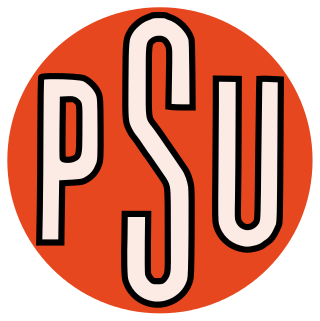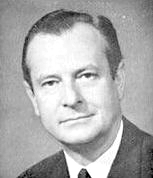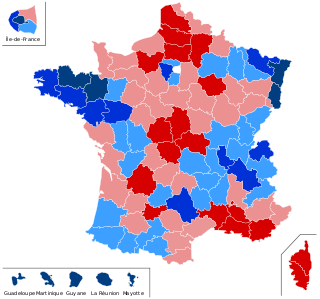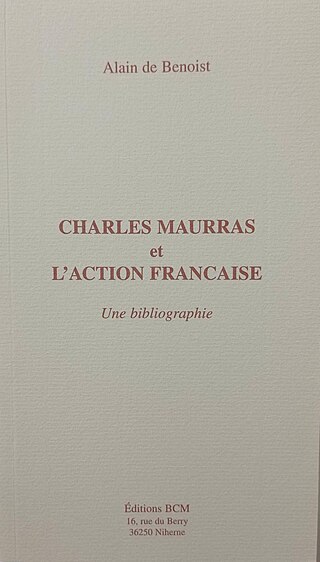
François Maurice Adrien Marie Mitterrand was a French politician who served as President of France from 1981 to 1995, the longest holder of that position in the history of France. As a former Socialist Party First Secretary, he was the first left-wing politician to assume the presidency under the Fifth Republic.

Gaullism is a French political stance based on the thought and action of World War II French Resistance leader Charles de Gaulle, who would become the founding President of the Fifth French Republic. De Gaulle withdrew French forces from the NATO Command Structure, forced the removal of Allied bases from France, as well as initiated France's own independent nuclear deterrent programme. His actions were predicated on the view that France would not be subordinate to other nations.

The Union for a Popular Movement was a liberal-conservative political party in France, largely inspired by the Gaullist tradition. During its existence, the UMP was one of the two major parties in French politics along with the Socialist Party (PS). The UMP was formed in 2002 as a merger of several centre-right parties under the leadership of President Jacques Chirac. In May 2015, the party was succeeded by The Republicans.

The Union for French Democracy was a centre-right political party in France. The UDF was founded in 1978 as an electoral alliance to support President Valéry Giscard d'Estaing in order to counterbalance the Gaullist preponderance over the political right in France. This name was chosen due to the title of Giscard d'Estaing's 1976 book, Démocratie française.

The Radical Party of the Left is a social-liberal political party in France. A party in the Radical tradition, since 1972 the PRG was a close ally of the major party of the centre-left in France, the Socialist Party. After the 2017 presidential and legislative elections, negotiations to merge the PRG with the Radical Party began and the refounding congress to reunite the parties into the Radical Movement was held on 9 and 10 December 2017. However, a faction of ex-PRG members, including its last president Sylvia Pinel, split from the Radical Movement in February 2019 due to its expected alliance with La République En Marche in the European elections and resurrected the PRG.

Xavier Bertrand is a French politician who has been serving as president of the regional council of Hauts-de-France since the 2015 regional elections.

Jean-Pierre Chevènement is a French politician who served as a minister in the 1980s and 1990s best known for his candidacy in the 2002 French presidential election. After serving as mayor of Belfort, he was elected to the Senate for the Territoire de Belfort in 2008. As a cofounder of the PS and founder of the Republican and Citizen Movement (MRC), he is a significant figure of the French left.

The Unified Socialist Party was a socialist political party in France, founded on April 3, 1960. It was originally led by Édouard Depreux.

Presidential elections were held in France in 1974, following the death of President Georges Pompidou. They went to a second round, and were won by Valéry Giscard d'Estaing by a margin of 1.6%. It is to date the closest presidential election in French history.

The New Royalist Action is a monarchist (Orléanist) political movement desiring to create a constitutional monarchy in France.

Jean Adrien François Lecanuet was a French centrist politician.
The Epinay Congress was the third national congress of the French Socialist Party, which took place on 11, 12 and 13 June 1971, in the town of Épinay-sur-Seine, in the northern suburbs of Paris. During this congress, not only did the party admit the Convention of Republican Institutions into its ranks, but the party leadership was also won by Mitterrand and his supporters. For the observers and the French Socialists themselves, the Epinay Congress was the real founding act of the current PS. It was also the turning point in Mitterrand's grand political plan, which led to the ascendancy of the French Left over the next quarter-century, and eventually, in 1981, to Mitterrand's election to the Presidency of France for two consecutive 7-year terms.
The Gauche Plurielle was a left-wing coalition in France, composed of the Socialist Party, the French Communist Party, the Greens, the Left Radical Party, and the Citizens' Movement. Succeeding Alain Juppé's conservative government, the Plural Left governed France from 1997 to 2002. It was another case of cohabitation between rival parties at the head of the state and of the government. Following the failure of the left in the 2002 legislative election, it was replaced by another conservative government, this time headed by Jean-Pierre Raffarin.
The Metz Congress was the seventh national congress of the French Socialist Party which took place on 6, 7 and 8 April 1979. The debate was influenced by the failure to update the Common Programme with the French Communist Party, and the unexpected defeat of the "Union of Left" at the 1978 legislative election.
European Parliament elections were held in France on 12 June 1994. Six lists were able to win seats: an alliance of the centre-right Union for French Democracy and the Gaullist Rally for the Republic, the Socialist Party, the Left Radical Party, the French Communist Party, the National Front and Philippe de Villiers' eurosceptic right-wing dissident UDF list, which formed the Majorité pour l'autre Europe. 53.5% of the French population turned out on election day, actually an improvement on the last election in 1989. The Greens, who were weakened by an Ecology Generation list led by Brice Lalonde and also suffering from internal divisions between the party's left and the right, lost all 9 seats won in 1989. Arlette Laguiller's Trotskyst Workers' Struggle (2.27%), Jean-Pierre Chevènement's left-wing eurosceptic Citizens' Movement (2.54%), the L'Europe commence à Sarajevo List (1.57%) and the agrarian populist Hunting, Fishing, Nature, Traditions (3.96%) were among the notable lists which did not pass the 5% threshold.

A referendum on the Maastricht Treaty for the founding of the European Union was held in France on 20 September 1992. It was approved by 51% of the voters. The result of the referendum, known as the "petit oui", along with the Danish "No" vote (50,7%) are considered to be signals of a transition into another stadium of European integration, away from the "permissive consensus" which had existed in most memberstates until then. From this point forward issues relating to European integration were subject to more intensive discussions across much of Europe, and later overt euroscepticism gained prominence. Only France, Ireland and Denmark held referendums on the Maastricht Treaty ratification.

Jacques Renouvin was a royalist militant in France during the Second World War and hero of the French resistance.

Georges Sarre was a French politician and leader of the Citizen and Republican Movement.

The Socialist Party is a French centre-left and social-democratic political party. It holds pro-European views. The PS was for decades the largest party of the "French Left" and used to be one of the two major political parties in the French Fifth Republic, along with the Union for a Popular Movement. It replaced the earlier French Section of the Workers' International in 1969 and is currently led by First Secretary Olivier Faure. The PS is a member of the Party of European Socialists, Progressive Alliance and Socialist International.

Charles Maurras, l'Action française et la question sociale is an essay by the French politician Bertrand Renouvin, co-founder of the Nouvelle Action française, published in 1983. It is an analysis of the economic thought of Charles Maurras.
















